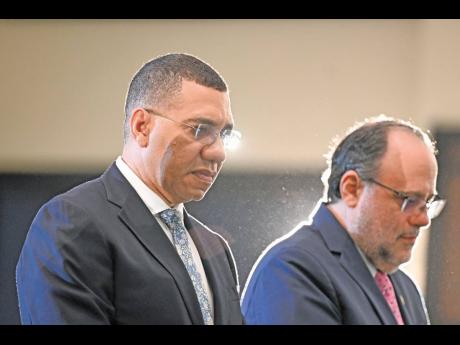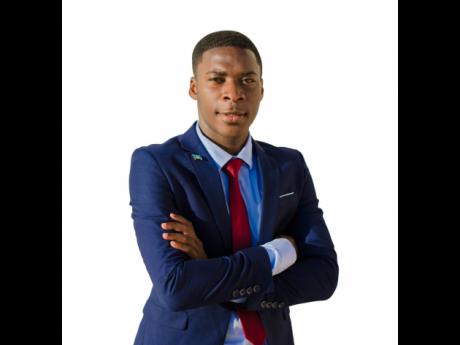Rahym Augustin-Joseph | Is dual citizenship (in)compatible with political leadership?
IS DUAL citizenship evidence of ‘split loyalties’ which should preclude individuals from the highest offices?
While this question is not new within the Caribbean, it has recently been discussed in Jamacia, where Prime Minister Holness argued that Mark Golding, leader of the PNP, should not hold the prime ministership on this basis as it suggests ‘split loyalties’. Since it was raised, and the political parties have shared their opposing stances, Golding has announced that he will renounce his British citizenship, irrespective of the Constitution not requiring it.
The Caribbean constitutions, however, vary on the ability of elected officials to hold dual citizenships, wherein it is not permissible in Suriname and Bahamas, as opposed to Barbados and others.
However, some believe it creates a perception that Golding could have a parachute in case anything goes wrong, and that he may not be fully subject to the laws of Jamacia. This is debatable as this is not how being subject to laws works.
Some politicians in the past, however, such as former Prime Minister Edward Seaga and Hon Camillo Gonsalves have renounced one of their citizenships to rebut any perception of split loyalties. This was not the case for Prime Minister Skerritt and Hon Peter Jean, among others.
Golding is accurate in his assertion, however, that the Constitution permits dual citizenship. The Jamaica Constitution under Section 40(2) essentially notes that no person shall be qualified to be a member of the House if they, through their own actions, have allegiance to another foreign power or state. However, Section 12 defines foreign power as a non-Commonwealth country, and once one is resident in Jamacia for 12 months while from a Commonwealth country, they are eligible. Because the prime minister emerges out of the legislature, it means that he can also possess dual citizenship. Words such as ‘allegiance’, ‘obedience’ or ‘adherence’ all require ventilation in order to remove ambiguity.
What is instructive about Section 40 (2) is that it contains a caveat in that the incident of an individual’s birth in a foreign country is not “his own” sufficient to disqualify him. Since a child cannot choose where to be born, the caveat by “virtue of his own act” seeks to exempt such individuals from disqualification but will not for those who voluntarily swear to a non-Commonwealth country through naturalisation.
However, the resolution is not the law, but politics. The law will pen what the resolution of the political debate yields. Golding, prior to his announcement, was retorting, albeit foolhardily, to the refuge of the law, suggesting that the reason for its continuation is that it is in the law. But, ignoring the underlying justificatory approach which may have informed the law itself, if there was any or engaging in the political debate about why it should remain or be jettisoned. Maybe if we locate the locus, we can address this issue in a serious way, particularly in the constitutional reform process which is keen on reviewing existing laws. The provision on dual citizenship is no different!
Irrespective of our historical connection in the Commonwealth, which may inform why one can hold dual citizenship, it is discriminatory to non-Commonwealth countries such as the USA and should be reviewed. Jamaicans seeking political office must therefore renounce their non-Commonwealth citizenship.
Holness seems to only be taking issue to this, because it can paint him as being a ‘hardcore’ Jamaican, fit for office, as opposed to Golding. The fact that Golding has decided he will renounce makes this argument harder to sustain, but Holness will probably maintain that it was his pressure which caused Golding to do so, and also that his previous unwillingness was indicative of his split loyalties. It would mean possibly that his hesitancy alone is problematic as suggested by Daryl Vaz from the JLP. The net effect is that this may be closed before it has been ventilated maturely by Jamaicans.
The emphasis on the prime minister is fair, but it ignores the fact that other parliamentarians with dual citizenship are also intimately involved in governance, particularly if they hold Cabinet positions. It means, according to Holness’ logic, that they too are making major decisions which can be influenced by other allegiances. So, should they be exempted? This should form part of the Constitutional Reform process, where the public, and not Holness and Golding could control the narrative with views.
This debate should consider the migratory nature and evidence of Jamaicans. It should not preclude them in the future from serving their country, especially when the Caribbean diaspora may be larger than mainland populations. There is always a need to also widen the eligibility pool to qualified Jamaicans who can enhance the quality of representation.
This is even more apposite when one does not have any evidence that dual citizenship has influenced one to make decisions influenced by another country. Therefore, Holness is not speaking from any empirical basis which justifies this automatic restriction on dual citizens.
Moreover, this ‘conflict’ may not be as prevalent, save for periods of conflicts within countries. I encourage all to read The Dual Citizenship and Political Representation Report by CAPRI which provides a telling analysis of legislation in Jamaica over a period of time which determined how frequently conflicts of loyalty might arise for legislators who are dual citizens. Less than one per cent.
In the end, this debate and decision must be put to the people so they can share their views. One can only hope that his renouncing does not mean that the discussion is ended, as today will be Golding and tomorrow will be another. The ideas must contend in order to resolve this political issue!
Rahym Augustin-Joseph, is from St Lucia and a bachelor of laws student at UWI Cave Hill. Send feedback to rahymrjoseph9@gmail.com and columns@gleanerjm.com


